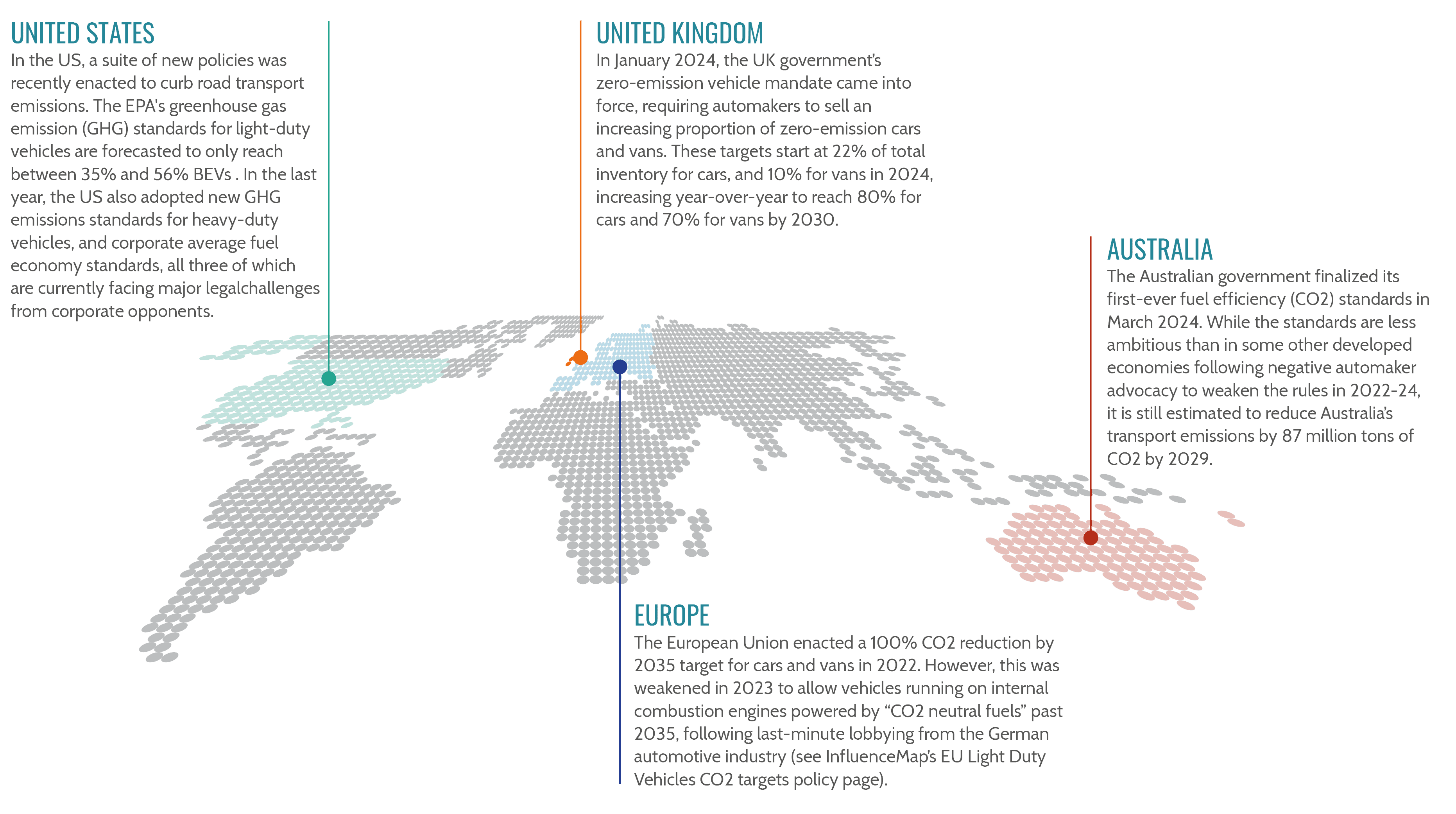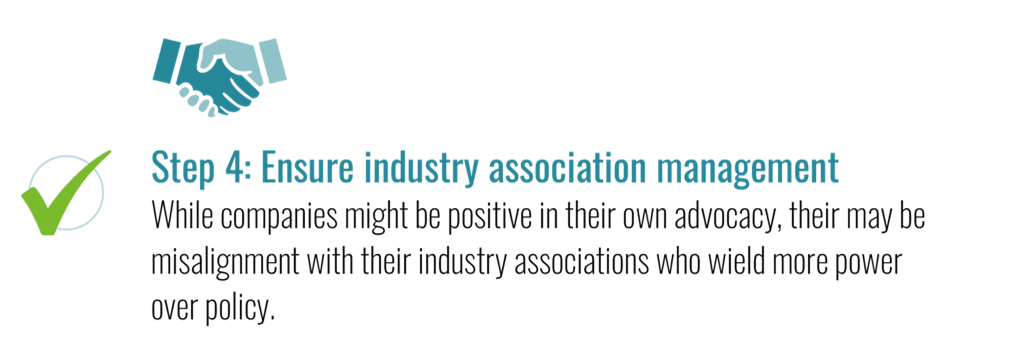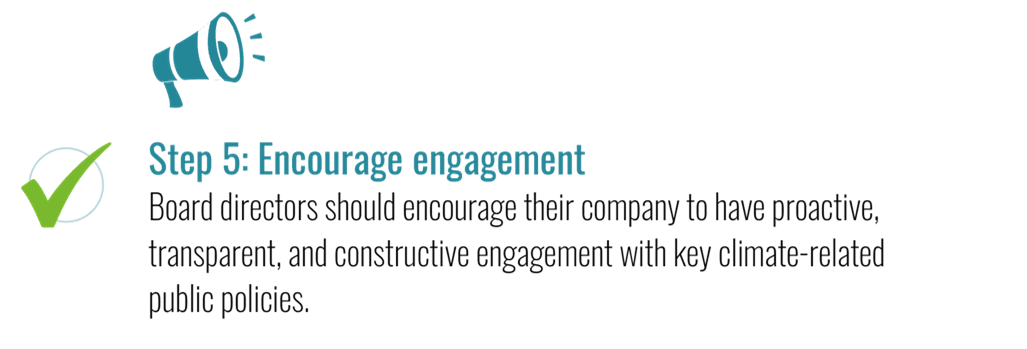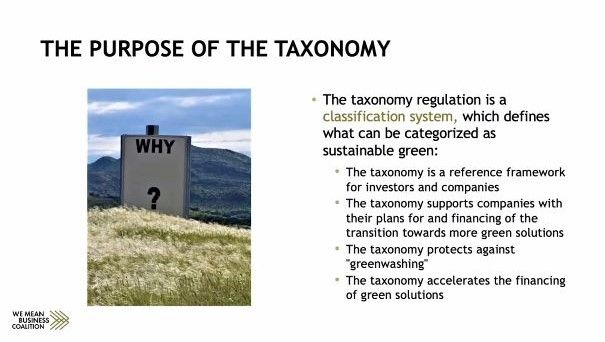This is the first briefing in a series providing board directors with an overview of the ‘do’s and don’ts’ of effective corporate climate policy engagement. The series includes real-world case studies of how companies are positively advocating for a policy environment that supports a transition to net zero, in line with science-based targets.
This briefing focuses on Road Transport and covers issues relevant to board directors of automotive-related companies, companies whose operations are dependent upon fleets of road vehicles, and companies involved in electricity production.
The briefing contains:
- Five key facts board directors need to know about corporate climate policy engagement in relation to road transport.
- A snapshot of the current policy and corporate advocacy landscape for road transport.
- Five steps board directors can take to support effective corporate climate policy engagement in the automotive and trucking industries.
The briefing leverages insights and case studies from InfluenceMap’s Lobbymap platform which systematically assesses the corporate climate policy engagement of over 500 companies and 250 industry associations globally.
Explainer: What is corporate climate policy engagement?
The UN Guide for Responsible Corporate Engagement in Climate Policy defines policy engagement as corporate activities to influence government policy around climate change (or any policy area) and the public discourse in which it is formed. This ranges from advertising, social media, public relations, and sponsoring research to direct contact with regulators and elected officials, the funding of campaigns and political parties, and participation in policy advisory committees.
The way corporations influence government policy is variously described as “advocacy”, “policy engagement” (used in this briefing) or “lobbying”. These processes are typically carried out by sections of the company termed “Government Relations,” “External Relations,” “Public Affairs/Relations,” “Legal,” and “Communications”.
Board directors should ensure they take advantage of the opportunities and mitigate against the risks associated with setting a company's policy engagement agenda. Climate policy engagement is becoming a mainstream sustainability and governance issue and has been codified by initiatives such as The Global Standard on Responsible Climate Lobbying. It is being incorporated into emerging standards determining the appropriate actions and disclosures required for net-zero aligned companies, from high-level initiatives such as the UN’s High-level Expert Group on Net Zero Standards, to regulated disclosure frameworks on corporate transition plans.
Five facts every Board director should know:
- Stable and supportive regulations will enable the road transportation industry to decarbonise successfully, but this is actively threatened by industry opposition. Advocacy from automakers and petrochemical companies has successfully weakened numerous policies to address these emissions in many key policy regions over the last two years, and large cross-sector industry associations are holding back road transport regulations. In the US, the US Chamber of Commerce has negatively engaged with GHG emissions standards for light-duty vehicles, and the National Federation of Independent Businesses strongly opposed GHG emissions standards for heavy-duty vehicles. In the EU, BusinessEurope opposed the EU’s policy to introduce a 100% CO2 emissions standard for cars and vans in 2035, while in Australia, the Australian Chamber of Commerce and Industry opposed the government’s proposed fuel efficiency (CO2) targets and pushed for some vehicles to be exempt from the targets.
- The weakening of decarbonisation goals may provide temporary financial benefits to transportation companies, but this risks a significantly more aggressive and financially punishing transition in the future. Globally, the transportation sector is responsible for approximately 15% of all CO2 emissions, with road transport accounting for approximately 87% of all transport emissions. Achieving significant emissions reductions in road transport is essential to limiting global warming to below 1.5°C or 2°C. However, the state of regulations to address these emissions varies greatly from region to region. Truck and auto manufacturers require clear, stable, and firm regulations to successfully decarbonise and avoid the worst impacts of climate change.
- Climate policy misalignments with industry associations can hinder corporate climate targets and addressing them is an important step towards effective and transparent policy engagement. Membership of such organisations negatively advocating on climate policy creates reputational risks, and engaging with such groups to positively reform their climate policy engagement strategies may be a key leverage point for Board Directors. In Australia, the Federal Chamber of Automotive Industries (FCAI) led a strategic campaign to weaken the introduction of the country’s first-ever fuel efficiency (CO2) standards. Following this, FCAI members Tesla and Volvo Cars subsidiary Polestar left the association in February 2024, with both companies making public statements critical of the FCAI’s advocacy campaign against the fuel efficiency standards. In the US, following the Truck and Engine Manufacturers Association’s (EMA) negative advocacy on heavy-duty vehicle emissions standards, Ford Motor left the EMA in January 2023, with such advocacy appearing to be misaligned with Ford’s internal electrification and GHG emission reduction goals.
- Opaque policy engagement can negatively impact a company's reputation as rising public scrutiny is placed on transparent disclosure of engagement with climate-related policies. Investors are also increasingly pressuring companies to adequately disclose their climate policy engagement activities on road transport, such as in a recent shareholder resolution lodged against US-based truck maker PACCAR. Investors led by Calvert requested significantly improved reporting on lobbying related to climate policy following evidence that PACCAR, both directly and through its industry associations, had advocated to weaken key US policies to promote zero-emission trucks.
- Board Directors of companies outside the automotive industry can also support regulations for road transport globally. Companies outside of the transport industry whose decarbonisation strategies typically rely on zero-emission fleets, have supported strong transport GHG standards in many regions. IKEA is a noteworthy example. The company recently supported ambitious heavy-duty vehicle GHG standards in the EU, issued support for clean transport rules in New Mexico (US), supported the US light-duty GHG rule through the CERES Corporate Electric Vehicle Alliance, and is an active advocate for numerous other key clean transport regulations globally. Electric utilities responsible for powering electric vehicle charging points could also benefit greatly from engaging with policies to promote the rapid electrification of road transportation and to reduce zero-emission vehicle costs. For example, electric utility companies Edison Electric Institute and ConEdison issued comments supporting US heavy-duty vehicle regulations in 2023, refuting opposition claims concerning insufficient infrastructure and an inability to adapt quickly to comply with ambitious standards.
A snapshot of the policy and corporate advocacy landscape: road transport
The IEA's updated 1.5°C scenario requires that 66% of all light-duty vehicle sales globally must be electric by 2030 to meet net-zero targets by 2050. Some policy regions have recently adopted targets that fall short of these targets, often following opposition from automakers and other engaged parties.
The primary policy tools used to decarbonise road transport consist of:
- Emissions standards, which mandate that new vehicles emit less per mile/kilometre travelled,
- Zero-emission vehicle (ZEV) mandates and internal combustion engine (ICE) phase-outs, which require automakers to sell increasing percentages of zero-emission vehicles or prescribe a date by which automakers can no longer sell combustion-powered engine vehicles
- Fuel economy standards, which require new vehicles to use less fuel per mile/kilometre travelled.
- Furthermore, policies also exist that incentivise corporate and consumer electric vehicle purchases (such as the US Inflation Reduction Act), or the installation of charging infrastructure, driving down emissions by boosting the adoption of electric vehicles.
Most regions have at least one of these key policies in effect right now, but targets can vary greatly from one region to another. For example, while the United States has a non-binding target of 50% ZEV sales by 2030, the EU has a 100% zero-emissions CO2 standard for 2035 for cars and vans. A recent paper, also highlighted the importance of policy mixes as a more successful lever to reduce emissions rather than individual policies, and so jurisdictions may begin to implement this in their emissions reduction strategies.

Five steps to corporate climate policy leadership in road transport

Climate change is often the responsibility of corporate sustainability teams. However, it is the regulatory and government affairs departments that have expertise with policy and regulations. Strategic corporate engagement on climate change policy requires these teams to be in lockstep. It also means allocating the appropriate resources to ensure climate policy is a top company priority. None of this will happen without C-suite direction, sign off, and, ideally, active participation.
Without such coordination, corporate climate policy engagement is typically limited to corporate and executive sign on letters. This tactic is no match against the well-resourced and relentless campaigns from sectors with a vested interest in blocking climate progress.
- Case study: The CEOs of Sony, Ricoh and Kao met with Taro Kono, Japan's minister of administrative reform in 2020 to strongly advocate for increased ambition on renewable energy, requesting a 40% renewable energy target by 2030. Sony’s CEO Kenichiro Yoshida reportedly stressed that their customers Apple and Facebook were demanding decarbonisation of their supply chains, and if Japan is unable to meet their targets, they will have to shift their factories outside of Japan.

Net-zero is facing a credibility crisis. While the concept has seen a tidal wave of corporate support, meaningful follow through has remained both challenging and rare. Companies can, however, make sincere efforts to deliver a net-zero future by using resources such as research by the IPCC and the IEA’s Net Zero by 2050 Roadmap to ensure their advocacy is underpinned by science-based benchmarks.
A growing number of climate-ambition initiatives are calling for the private sector to use responsible corporate climate policy engagement to advocate for global net zero targets. For example, the updated Race to Zero criteria requires members to “align external policy and engagement, including membership in associations, to the goal of halving emissions by 2030 and reaching global (net) zero by 2050”. Likewise, the UN Secretary-General’s expert group on net-zero commitments of non-state entities recommends “non-state actors must align their external policy and engagement efforts, including membership in trade associations, to the goal of reducing global emissions by at least 50% by 2030 and reaching net zero by 2050”.
- Case study: In May 2023, in an Australian consultation response on a proposed fuel efficiency standard, automobile company Tesla’s submission listed the 1.5°C temperature goal of the Paris Climate Agreement to support the company’s position.

Comprehensive and transparent reporting on climate policy engagement can lay the groundwork for meaningful action and accountability. Companies are now facing growing scrutiny over their climate change policy engagement. Some of this pressure comes from investor processes like Climate Action 100+ (CA100+), a voluntary initiative of 700 investors responsible for over $68 trillion in assets under management, working to ensure the world's largest corporate greenhouse gas emitters take necessary action on climate change. Through CA100+ as well as various other investor initiatives, shareholders have been requesting enhanced disclosures from companies on the topic of climate policy engagement and industry association membership.
Given the critical role for government policy, corporate policy engagement is increasingly seen by investors as an important indication of management thinking on the climate crises. Negative or inconsistent approaches to corporate advocacy signal either that a company isn’t ready for the transition or does not yet have the adequate governance mechanisms in place to manage it. On the contrary, strategic, coordinated, and highly supportive policy engagement is a clear indication of a company at the forefront of addressing the transition in its industry.
- Case study: Corporate disclosure of engagement on road transport climate regulations has been improving but remains inadequate. Climate policy engagement reviews provide a mechanism for companies to assess the extent to which their direct and indirect (through industry associations) real-world advocacy is aligned with the 1.5°C goal of the Paris Agreement. Since 2022, eight automakers globally have published such a climate policy engagement review (BMW, Ford, General Motors, Mercedes-Benz, Nissan, Toyota, Volvo Group and Volkswagen). However, these disclosures still fall short of the investor expectations outlined in the Global Standard on Responsible Climate Lobbying. For example, many automakers have not transparently assessed the detailed real-world positions and engagement activities of their industry associations, instead reviewing only their top-line climate positions.

Having a clear oversight system for the board will also help avoid reputational and litigation risks should your company's climate commitments not align with the advocacy policies of the trade associations of which your company is a member. While many companies do not actively engage on climate, most have links to entities that do. InfluenceMap research shows that many powerful cross-sector industry associations like the US Chamber of Commerce, BusinessEurope, and Japanese Federation of Business (Keidanren) remain actively opposed to Paris-Aligned climate policy.
While companies might be positive in their own advocacy, their industry associations wield more power over policy, emphasising the huge sectors of the economy among their membership. Given the relative power of these organisations, any dues-paying company lending credibility to an obstructive industry group is running a huge deficit on climate policy influence. In other words, even the most positive companies can be “net-obstructive”, with their own advocacy easily outweighed by the activity of the groups acting in their name.
Companies can take any number of steps to address the issue, from engaging within the group to reform its positions to ceasing membership. In response to investor pressure, nearly 60 companies have published enhanced disclosures on the topic. To have meaningful impact, however, these disclosures need to be followed by a robust program to address any misalignment between a company and its industry associations, including steps the company will take to evolve the group’s positions.
- Case study: Positive industry associations and corporate alliances remain a powerful tool for influencing policy and building support for regulations. The Australia-based Electric Vehicle Council, whose members include Volkswagen, BMW, and Hyundai, engaged with the Australian Government in support of ambitious fuel efficiency standards in March 2024 and June 2023, advocating against flexibilities that would weaken the rule. Moreover, positive statements from key truck manufacturers Ford, Cummins, and other manufacturers collectively supported a strong US heavy-duty rule in February 2024 as a part of the newly-formed Heavy Duty Leadership Group.

Board Directors should encourage their company to have proactive, transparent and constructive engagement with key climate-related policies. Corporate climate policy leadership means utilising the whole range of tactics to support robust and ambitious climate policy – from PR campaigns to drive political support for policy action, to detailed technical input to ensure an ambitious and effective end result.
The UN’s 2013 Guide on Responsible Climate Policy Engagement provides a sound overview of tactics companies might deploy in favour of climate policy. None of these alone are sufficient, but instead must be leveraged as part of consistent campaigns that provide policymakers with ample evidence of business buy-in for ambitious climate policy outcomes.
- Case study: In the EU, Ford Motor has consistently supported ambitious decarbonisation policies in the road transport sector. Ford supported the EU’s 2035 100% CO2 emissions reduction ZEV target for cars and vans in statements in March 2023 and it opposed significant loopholes in the policy in a March 2023 joint letter, where it was joined by 47 other companies including IKEA, Volvo Cars, Maersk and Unilever.
Want to learn more?
- InfluenceMap’s detailed overview of the five steps Board Directors should consider helping companies achieve corporate climate policy leadership.
- InfluenceMap’s open access LobbyMap platform tracks and assesses the policy engagement activities of over 500 companies and 250 industry associations. Further resources and best-practice guidance on corporate climate policy disclosures and reviews from InfluenceMap are available. A good summary of additional resources, toolkits and frameworks can be found via We Mean Businesses’ Framework for Responsible Policy Engagement.
- InfluenceMap’s regional platforms and Automotive Tool provide real-time analysis of how key climate policies are developing, including analysis of how companies and industry associations across the database are already engaging. For further guidance on positive intervention opportunities, please contact Lucca Ewbank ([email protected]) for EU/Global questions or US Transport Policy Analyst Leo Menninger ([email protected]) for US specific questions.
- For further information on the Climate Governance Initiative's work, or interest in joining our global network, please contact [email protected]



